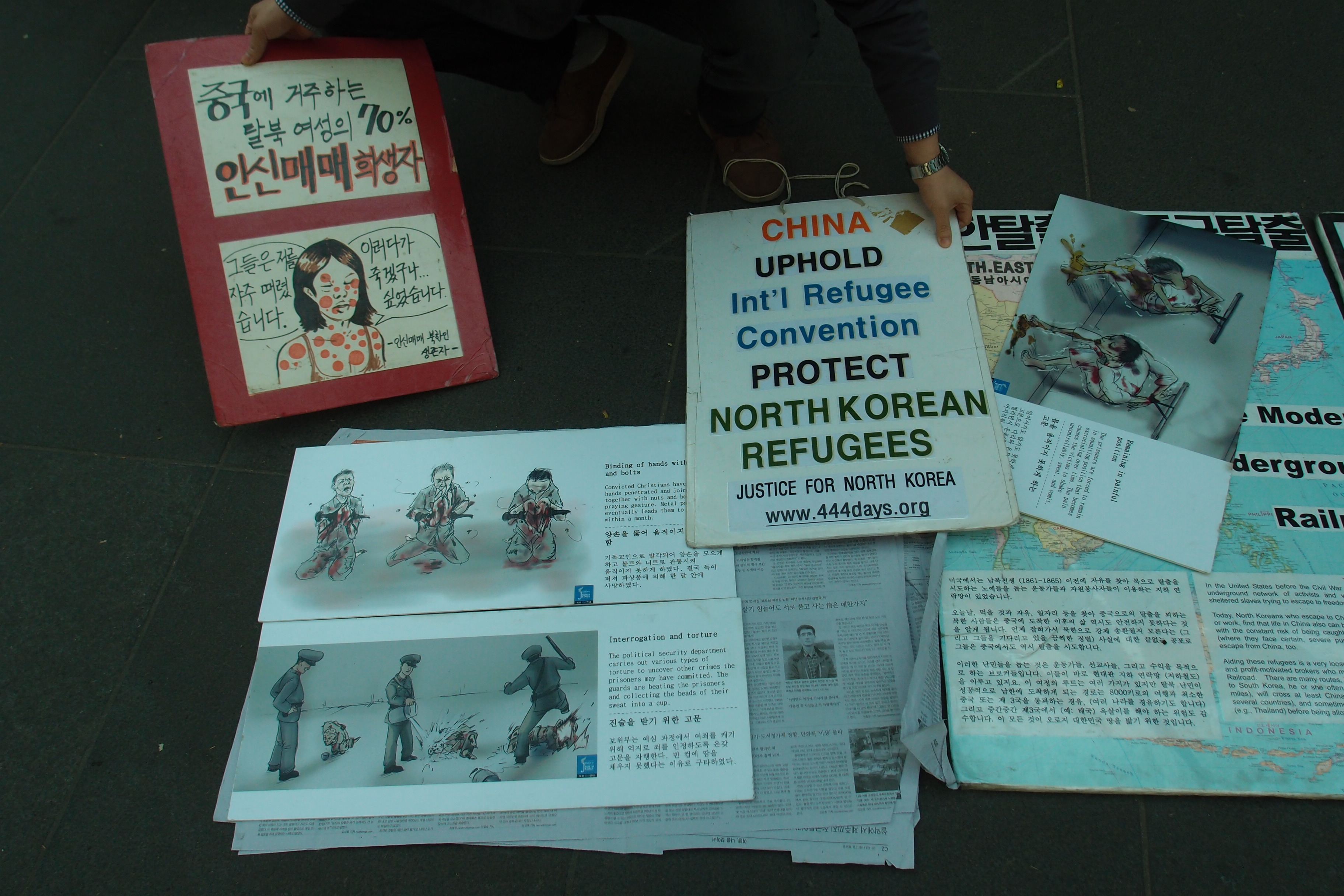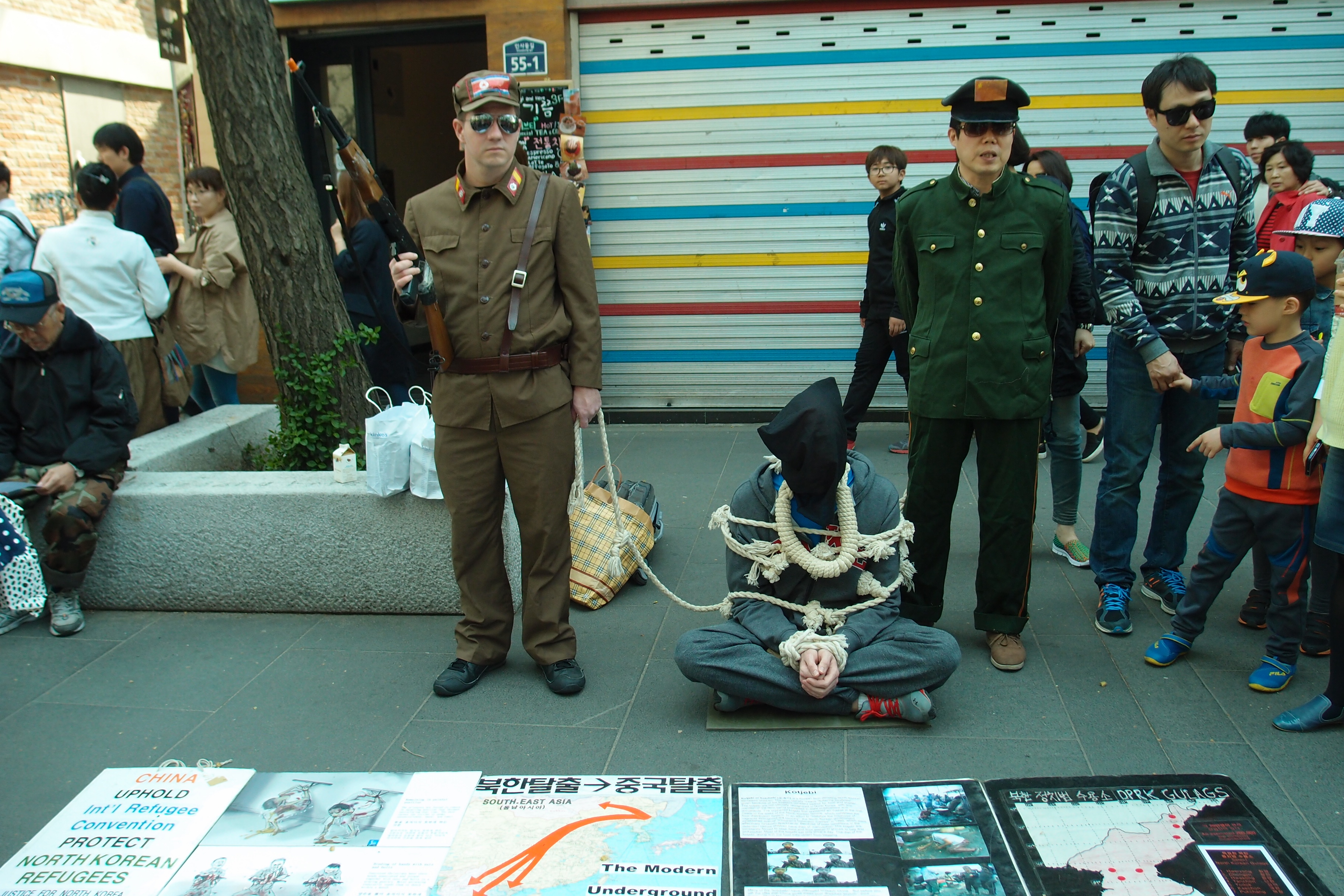SEOUL, South Korea — Nongovernmental organization Justice for North Korea (JFNK) launched a street campaign last Saturday in Insadong Street, Central Seoul to bring attention to the North Korean crisis.
Founder of JFNK and activist Peter Jung and street campaign coordinator Aaron Peterson held the campaign with four volunteers. Three people handed out flyers which explained about the organization and North Korea’s situation briefly in Chinese, English and Korean, while the remaining volunteer helped Jung and Peterson to role-play as an arrested defector, Chinese and North Korean soldiers.
 The main purpose of the campaign is to raise awareness of human rights violations in North Korea and to protest against China’s repatriation of North Korean refugees.
The main purpose of the campaign is to raise awareness of human rights violations in North Korea and to protest against China’s repatriation of North Korean refugees.
“The reason why we are role-playing is to give a more specific idea about how North Korean defectors are treated inhumanely, as well as to call on the Chinese government to stop the policy of repatriation. We also collect donations to support the process of bringing them over to South Korea safely,” Peterson explained.
Peter Jung founded JFNK in May 2007, when he staged a demonstration alone against Chinese authorities for 444 days, beginning May 23, 2007. He continued the protest until the first day of the 2008 Olympic Games in Beijing, Aug. 8, 2008.
“There are still many defectors who are in need of help. I still contact with them, so I can’t abandon this campaign,” he said.
According to a White Paper published by the South Korean think-tank Korea Institute for National Unification (KINU) in 2011, China and North Korea have been cooperating in the strict controls over North Korean refugees near the border under a “Bilateral Agreement on Mutual Cooperation for the Maintenance of State Safety and Social Order.”
The UN Commission’s report states that Chinese authorities started to oppress North Korean refugees more severely by tightening border security and cracking down at the end of 2013. The report condemns China for breaching international human rights and refugee laws, as North Korean refugees’ lives are threatened in their country once they are sent back.
The 1951 Refugee Convention describes a refugee as one who, “owing to a well-founded fear of being persecuted for reasons of race, religion, nationality, membership of a particular social group or political opinion, is outside the country of his nationality, and is unable to, or owing to such fear, is unwilling to avail himself of the protection of that country.”
Despite the international community’s criticism, China has been sticking to its position, considering defectors as illegal immigrants.
Jung emphasized that the South Korean government has to discuss North Korean defectors with China as soon as possible. “If they are forcibly repatriated to North Korea, they will either face the most severe punishment in the political prison camp or be publicly executed. Therefore, the South Korean government should urge the Chinese government to stop it through diplomatic negotiations. Also, the South Korean embassy needs to accept them,” Jung said.
Peterson started to get involved in JFNK two years ago. “I first heard about the North Korean crisis through a National Geography documentary, I was completely shocked — when I watched how North Korean people were brainwashed and isolated from the whole world. This made me become a North Korean activist, because I didn’t feel like enough people knew about what is happening in North Korea,” Peterson said.
The American activist said that he has felt some changes since he began the street campaign. “I can see more and more people are starting to pay attention. Of course, some South Koreans don’t seem to care much, but a lot of them are starting to take pictures of our demonstration and ask for flyers. Most people are very supportive. We would like to see more of that. I’m sure that it will become something that the world leaders have to address in the future,” he said.
Jung and Peterson said that they will not stop this campaign. “We will continue it until North Korean refugees settle down in South Korea or third-party countries, not being repatriated,” Jung said.
EJ Monica Kim
Photo by EJ Monica Kim
